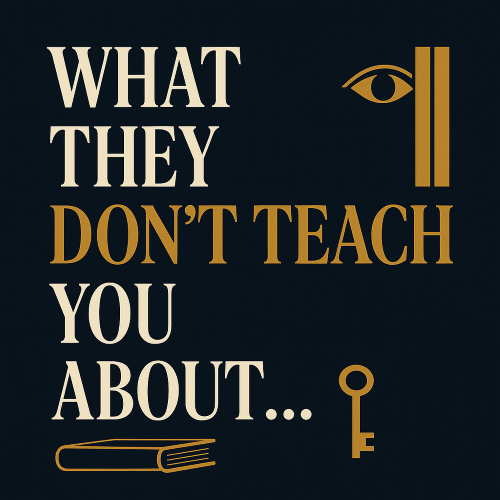What they don’t teach you about how conservatism was built to protect aristocracy and privilege.

"Conservatism, as a political ideology, is often presented as a philosophy of tradition, order, and cautious change".
"However, what's often left unexamined is how its historical and intellectual foundations were explicitly designed to protect the interests of the aristocracy and the privileged classes from the disruptive forces of social and political change".
"This isn't to say that all conservative thought is solely about self-interest, but rather that its core principles were forged in a reaction to democratic and egalitarian movements that threatened established hierarchies".
The Reaction to the French Revolution
Modern conservatism's intellectual origins are largely a reaction to the French Revolution (1789). The revolution's radical overthrow of the monarchy, the aristocracy, and the Church terrified the traditional elites of Europe. Edmund Burke, an Irish statesman and a founding figure of modern conservatism, articulated this fear in his seminal work, Reflections on the Revolution in France (1790).
-
Critique of Abstract Rights: Burke was deeply skeptical of the revolutionaries' reliance on "abstract rights" and radical reason. He argued that society was a complex, organic entity that had evolved over centuries, not something that could be remade overnight based on a priori principles. He believed that sudden, radical change would lead to chaos and anarchy, as it did during the Reign of Terror. This emphasis on gradual, evolutionary change over revolutionary upheaval became a cornerstone of conservative thought.
-
The Defense of Hierarchy: Burke and other early conservatives defended a hierarchical society with a landed aristocracy at its head. They argued that this social structure was natural and necessary for stability. They saw the aristocracy as a class of "natural leaders" who, by virtue of their inherited position and accumulated wisdom, were best suited to govern. This view directly challenged the revolutionary ideal of equality and meritocracy, which threatened to dismantle the very system from which they benefited.
Property, Power, and the Fear of the "Mob"
A central tenet of conservatism from its inception has been the protection of private property. Early conservatives argued that property was the foundation of a stable society and that its preservation was a primary duty of government. This emphasis was not merely philosophical; it was a direct defense of the immense landholdings and inherited wealth of the aristocracy. The fear of property redistribution—a key demand of many revolutionary and socialist movements—became a defining feature of conservative politics.
-
The Limited Franchise: For centuries, conservative parties in countries like the UK and the U.S. fought to limit the right to vote to a small class of propertied men. This was a clear strategy to ensure that political power remained in the hands of those with the most to lose from radical change. The expansion of the franchise to the working class and later to women was viewed with deep suspicion, as it was seen as an invitation for the "mob" to seize power and threaten private property. This historical opposition to universal suffrage reveals a core belief that democracy should be constrained to protect the interests of the elite.
The "Tradition" of Privilege
Conservatism often speaks of a reverence for tradition. However, a deeper look reveals that this "tradition" often serves to legitimize existing power structures and hierarchies. The traditions of inherited wealth, class distinctions, and social deference are not accidental; they are the result of historical processes that concentrated power in the hands of a few.
-
The Justification of Inequality: Conservatives have historically provided intellectual justifications for inequality. They have argued that inequality is a natural and even beneficial outcome of a free society, as it provides an incentive for hard work and innovation. However, this argument often ignores the systemic advantages that a privileged class enjoys, and it downplays the role of inherited wealth and social connections in determining success. This perspective serves to reinforce the status quo and to discourage policies that would redistribute wealth or power.
Modern Conservatism and the Legacy of the Past
While modern conservatism has adapted to the realities of mass democracy, its core principles retain a legacy of protecting privilege.
-
Tax Cuts and Deregulation: Contemporary conservative policies, such as significant tax cuts for the wealthy and corporations, are often justified with the promise of "trickle-down" economic benefits. However, critics argue that these policies primarily serve to entrench the wealth of the already-rich, while deregulation and the weakening of unions undermine the economic power of the working and middle classes.
-
Opposition to Social Programs: The historical fear of a powerful state and the "tyranny of the majority" is now often expressed as opposition to robust social welfare programs. While this opposition is framed in terms of "fiscal responsibility," it also aligns with the interests of the wealthy, who would bear the brunt of the taxes required to fund such programs.
In conclusion, a critical analysis of conservatism reveals that its intellectual and historical foundations were built to protect a specific class of people: the aristocracy and the wealthy. While it has evolved and adapted over time, its core principles of gradual change, reverence for tradition, and protection of property remain powerful tools for maintaining established hierarchies and resisting radical challenges to power.
- Questions and Answers
- Opinion
- Motivational and Inspiring Story
- Technology
- Live and Let live
- Focus
- Geopolitics
- Military-Arms/Equipment
- Ασφάλεια
- Economy
- Beasts of Nations
- Machine Tools-The “Mother Industry”
- Art
- Causes
- Crafts
- Dance
- Drinks
- Film/Movie
- Fitness
- Food
- Παιχνίδια
- Gardening
- Health
- Κεντρική Σελίδα
- Literature
- Music
- Networking
- άλλο
- Party
- Religion
- Shopping
- Sports
- Theater
- Health and Wellness
- News
- Culture

